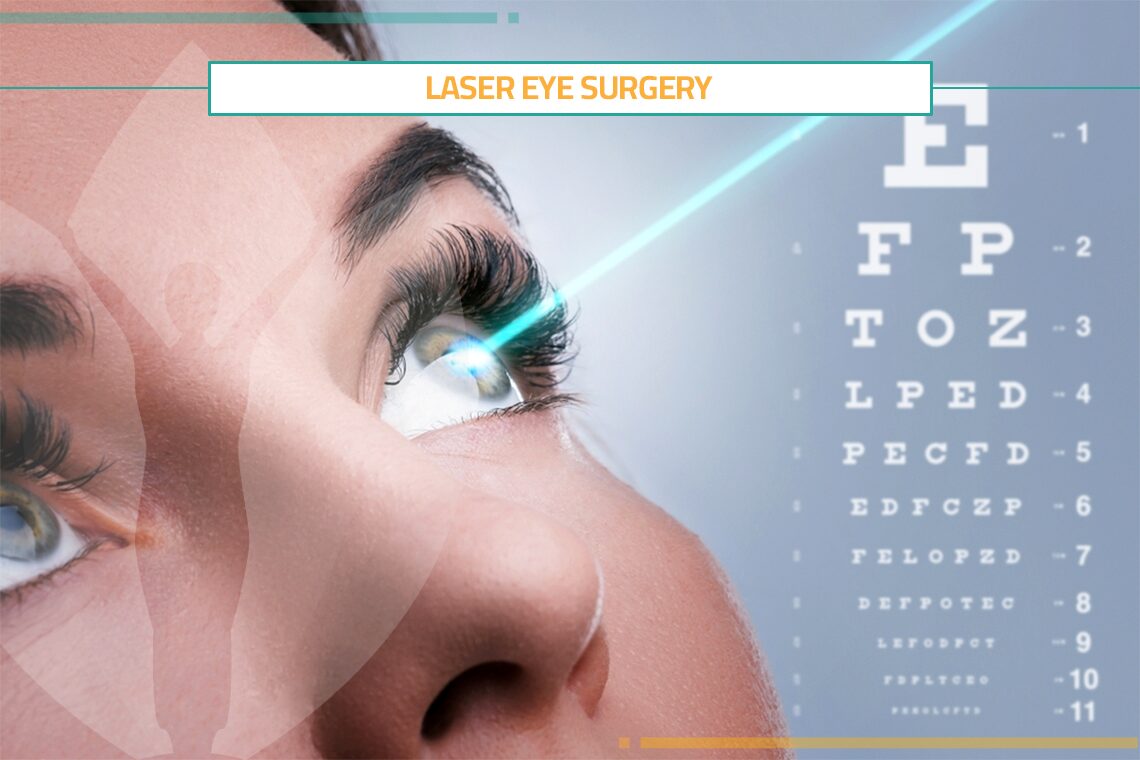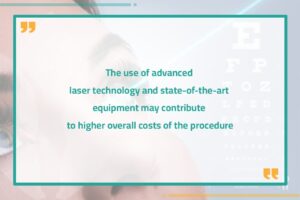Laser Eye Surgery
Laser eye surgery, also known as LASIK (laser-assisted in situ keratomileusis), is a popular procedure used to correct vision problems. During the surgery, a laser is used to reshape the cornea, allowing light to be properly focused onto the retina, thus improving vision.
This procedure is commonly used to treat nearsightedness, farsightedness, and astigmatism. Many people opt for laser eye treatment as it can reduce or eliminate the need for glasses or contact lenses.
Before considering this procedure, it’s important to consult with an ophthalmologist who can determine if you are a suitable candidate for it. They will evaluate your eye health, vision prescription, and overall medical history to ensure that you are a good candidate for the procedure.
It’s essential to weigh the potential benefits of improved vision against the risks and potential side effects of the surgery. These may include dry eyes, glare, halos, and difficulty with night vision. Your ophthalmologist will provide you with detailed information about what to expect before, during, and after the surgery.
If you decide to proceed with laser it’s important to choose a reputable and experienced surgeon to ensure the best possible outcome. Be sure to ask questions about the surgeon’s experience, success rates, and the specific techniques they use.
Overall, laser eye surgery can be a life-changing procedure for many individuals, providing them with clear vision and greater freedom from glasses or contacts.
Potential Side Effects of Laser Eye Surgery
While laser eye surgery can significantly improve vision for many individuals, it’s important to be aware of the potential side effects and risks associated with the procedure. Some commonly reported side effects include: dry eyes, glare, halos, and difficulty with night vision. However, it is crucial to note that these side effects are often temporary and typically subside within a few weeks or months after the surgery.
Additionally, there is a small risk of more severe complications, such as infection, corneal scarring, and vision loss. It is important to discuss these potential risks and complications with your ophthalmologist before deciding to proceed with laser eye surgery. In summary, the surgery is an effective and popular procedure for correcting vision problems.
Once you have made the decision to proceed with laser vision correction, it is crucial to select a skilled and experienced surgeon to perform the procedure. When choosing a surgeon, there are several factors to consider.
Experience and Credentials
It is essential to inquire about the surgeon’s experience in performing laser vision correction procedures. Ask about their credentials, including board certification and specialized training in refractive surgery.
Success Rates
Inquire about the surgeon’s success rates with laser vision correction. A reputable surgeon should be able to provide you with statistics on their patients’ outcomes and satisfaction with the procedure.
Technique and Technology
Ask the surgeon about the specific techniques and technology they use for laser vision correction. Inquire about their familiarity with the latest advancements in the field and their access to state-of-the-art equipment.
Patient Testimonials
Request to see testimonials or case studies from previous patients who have undergone laser vision correction with the surgeon. Hearing about other individuals’ experiences can provide valuable insight into the surgeon’s skills and patient care.
Open Communication
Choose a surgeon with whom you feel comfortable and who is willing to address all your concerns and questions. Open communication and a collaborative approach to decision-making are essential in ensuring a successful surgical experience.
By carefully evaluating these factors and choosing a reputable and experienced surgeon, you can increase the likelihood of a positive outcome from your laser vision correction procedure.
Read about the best Types of Lips Filler
Understanding the Cost of Laser Eye Surgery
When considering laser eye surgery, it’s important to understand the cost associated with the procedure. The cost of laser eye surgery can vary depending on several factors, including the surgeon’s experience and expertise, the technology and equipment used, and the location of the surgical facility.
Factors Affecting Cost:
Surgeon’s Experience and Expertise
Highly experienced and reputable surgeons may charge higher fees for their expertise and successful track record in performing laser eye surgery.
Technology and Equipment
The use of advanced laser technology and state-of-the-art equipment may contribute to higher overall costs of the procedure.
Location of the Surgical Facility
The cost of living and operating expenses in different regions can impact the overall cost of laser eye surgery.
Financing Options
Many surgical facilities offer financing options to help patients manage the cost of laser eye surgery. It’s essential to inquire about financing plans and payment options during your consultation with the surgeon or their staff.
Insurance Coverage
While laser eye surgery is considered an elective procedure, some insurance plans may offer partial coverage or discounts for certain types of laser vision correction. It’s advisable to check with your insurance provider to explore any potential coverage options.
Consultation and Transparent Pricing
During the consultation with your surgeon, it’s important to discuss the total cost of the procedure, including pre-operative evaluations, surgery, and post-operative care. Ensure that the pricing is transparent and includes all anticipated expenses.
By understanding the factors that influence the cost of laser eye surgery and exploring financing options, you can make an informed decision about pursuing this life-changing procedure. When choosing a surgeon, consider their expertise and the value they provide, rather than solely focusing on the cost.
When considering laser eye surgery, it’s important to understand the cost associated with the procedure.
Benefits of Laser Eye Surgery
Laser eye surgery offers a range of benefits for individuals seeking to improve their vision and reduce their reliance on glasses or contact lenses. Understanding these potential benefits can help you make an informed decision about whether laser eye surgery is the right choice for you.
Improved Vision
One of the primary benefits of laser eye surgery is the significant improvement in visual acuity that many individuals experience. By reshaping the cornea, the procedure can correct nearsightedness, farsightedness, and astigmatism, leading to clearer and sharper vision.
Reduced Dependence on Corrective Lenses
For those who have worn glasses or contact lenses for years, laser eye surgery can offer the freedom of not relying on these corrective eyewear options. Many patients find that they no longer need to use glasses or contacts for everyday activities after undergoing the procedure.
Convenience and Lifestyle Enhancement
The freedom from glasses or contact lenses can enhance your lifestyle and activities. Whether it’s participating in sports, enjoying outdoor activities, or simply waking up to clear vision each day, laser eye surgery can provide a newfound convenience and freedom.
Long-term Cost Savings
While laser eye surgery involves an upfront cost, many individuals find that the long-term savings from not purchasing glasses, contacts, and associated accessories can offset the initial investment over time.
Quick Recovery and Results
Most patients experience a relatively quick recovery period after laser eye surgery, with noticeable improvements in vision within a few days. The procedure can offer rapid results, allowing individuals to return to their daily activities with improved vision in a short amount of time.
Psychological and Emotional Benefits
Clear vision can have a positive impact on your overall well-being, confidence, and self-esteem. Many individuals report feeling more confident and comfortable in their appearance and abilities after undergoing this surgery.
By weighing these potential benefits against the risks and considering your individual circumstances, you can make an informed decision about whether it aligns with your vision correction goals and lifestyle preferences.
Discover the best Arms liposuction techniques
Understanding the Risks of Laser Eye Surgery
While laser eye surgery offers numerous benefits, it’s crucial to understand and consider the potential risks and complications associated with the procedure. Prior to undergoing it, it’s important to have a comprehensive discussion with your surgeon about these potential risks. Some of the risks associated with laser include:
Dry Eyes
Following the procedure, some individuals may experience dry eyes or a decrease in tear production, which can lead to discomfort and temporary vision disturbances.
Under correction or Overcorrection
In some cases, the desired level of vision correction may not be achieved, resulting in undercorrection or overcorrection, which may require additional procedures or ongoing vision correction with glasses or contact lenses.
Glare, Halos, or Double Vision
Individuals may experience visual disturbances such as glare, halos, or double vision, particularly in low-light conditions, which can impact their overall visual quality.
Flap Complications
For procedures such as LASIK, where a corneal flap is created, there is a risk of flap-related complications, including displacement, wrinkles, or debris under the flap, which may require further treatment.
Infection or Inflammation
Although rare, there is a risk of developing infections or inflammation in the eyes following it, which may necessitate prompt medical attention.
Regression
Some individuals may experience a regression of the initial vision correction over time, requiring additional procedures or adjustments.
It’s important to note that while these risks exist, the majority of individuals who undergo this surgery achieve successful outcomes with minimal complications. By thoroughly discussing the potential risks with your surgeon and ensuring that you are a suitable candidate for the procedure, you can make an informed decision about pursuing it.
Making an Informed Decision
Ultimately, making an informed decision about laser eye surgery involves weighing the potential benefits against the risks. You should understand how the procedure aligns with your lifestyle and vision correction goals. It’s essential to have open and thorough discussions with your surgeon, addressing any concerns or questions you may have about the procedure. By carefully considering these factors and seeking the guidance of a reputable and experienced surgeon. You can make a well-informed decision about pursuing laser eye surgery. The eye is ideally suited for laser surgery because most of the eye tissue is transparent.






